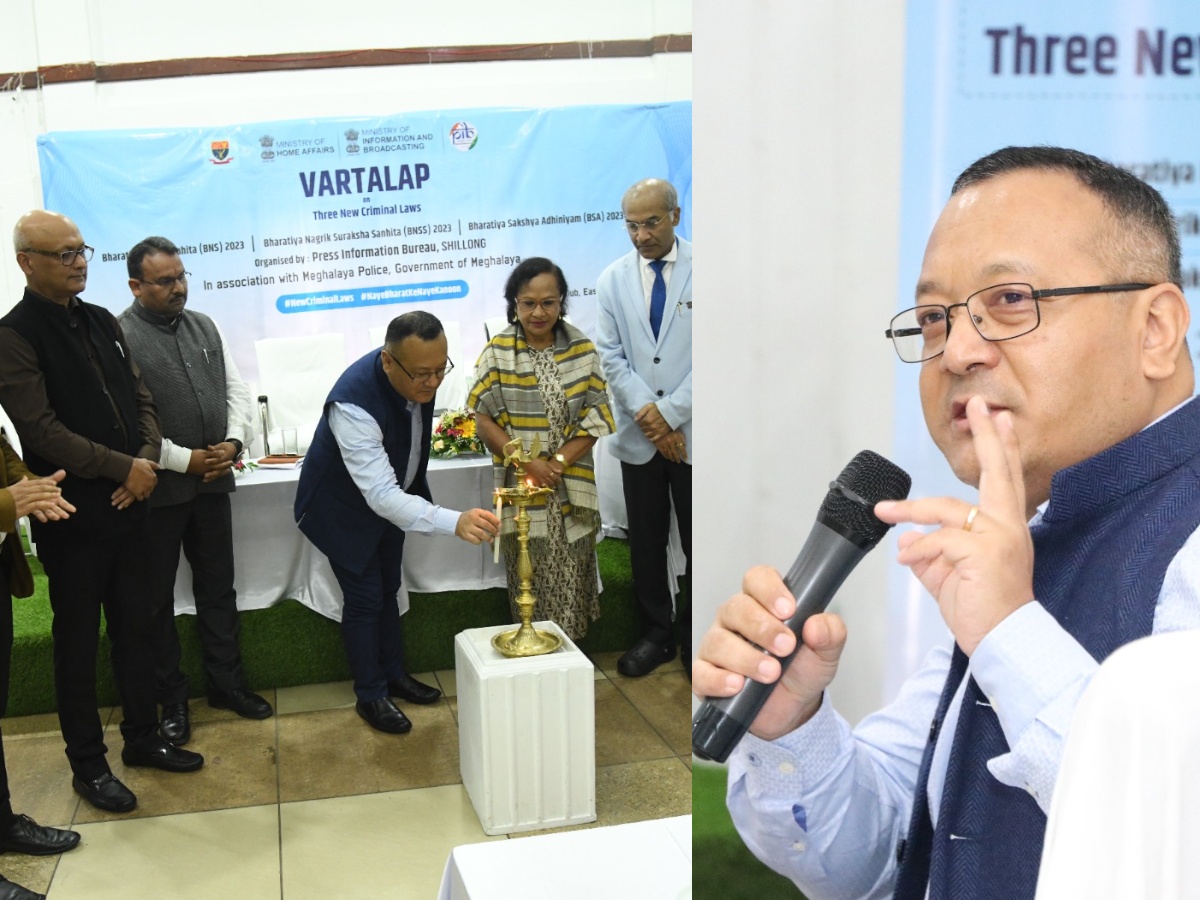Dy. Inspector General of Police (ER) Davis N R Marak on Thursday said a total of 2561 police personnel in Meghalaya have been trained in on the three new Criminal Laws ‘Bharatiya Nyaya Sanhita’ (BNS), ‘Bharatiya Nagarik Suraksha Sanhita’ (BNSS) and ‘Bharatiya Sakshya Adhiniyam’ (BSA) of 2023, which will come in force on 1st July, 2024.
Addressing a gathering at the Vartalap, a Media Workshop organised by Press Information Bureau, Ministry of Information & Broadcasting, Government of India, Shillong in association with the Meghalaya Police, Marak said Meghalaya Police is fully prepared to implement them.
“The officers are trained on the applicability of new laws and how they should perceive them while dealing with the crime and cases related to it,” he added.
Describing these laws as a shift from an archaic colonial system, he said that these new laws have been designed and are being enacted by the government after considering it expedient and necessary to review the existing criminal laws with an aim to strengthen the law and order.
He said that the new laws represent a new direction for the criminal justice system of the country. The new laws also focus on simplifying legal procedures to make existing laws relevant to contemporary situations and to provide speedy justice to common man, he added. He said that Bharatiya Nyaya Sanhita (BNS), as the name suggests, focuses on Nyaya or Justice and hence the change in name since there is a shift in focus from punishment in the IPC to Justice or Nyaya in the BNS.
Underlining the emphasis on time bound verdicts and the limits on adjournments under the new laws, the DIG said that a citizen-centric criminal procedure has been adopted in the Bharatiya Nagarik Suraksha Sanita 2023 or the BNSS which has replaced the CrPC. He explained how the BNSS mandates a standardized procedure for recording, collecting, transporting and storing forensic evidence.
Marak said that the three laws will focus on justice rather than punishment and are aimed at providing speedy justice. He said, “timelines have been prescribed for time bound investigation, trail and pronouncement of judgements. Citizen-centric approach has been adopted for supply of copies of FIR, including by digital means, summary trails have been made mandatory for petty cases. The accused persons may be examined through electronic means like video conferencing and the Magisterial system has also been streamlined”.
While explaining the Bharatiya Sakshya Adhiniyam, Shri Marak said that the Indian Evidence Act was enacted in 1872 and has been in use with some amendments but the lEA does not address the technological advancements undergone in the country in the last few decades. The new Law i.e., The Bharatiya Sakshya Adhiniyam, 2023 or the BSA provides for evidence to be provided electronically and permit appearance of witnesses, accused persons, experts and victims through electronic means like video conferencing. Other changes have also been brought to incorporate various technological advances, he added.
While concluding he said that the transition from the old criminal laws to the new criminal laws is the need of the hour which makes the Criminal Justice System more citizen friendly, more accessible to the public and more transparent.
During the panel discussion, moderated by Ratul Barua, former News Editor of the Meghalaya Guardian and Communication Manager for the Forest Department of Assam, several key figures contributed their insights. It included Patricia Mukhim, Editor of The Shillong Times, Shri Vivek Syiem, IPS, Assistant Inspector General of Police, Shillong, Khalid Khan, Additional Advocate General, Meghalaya, R L Blah, and Anita Nongkhlaw.


